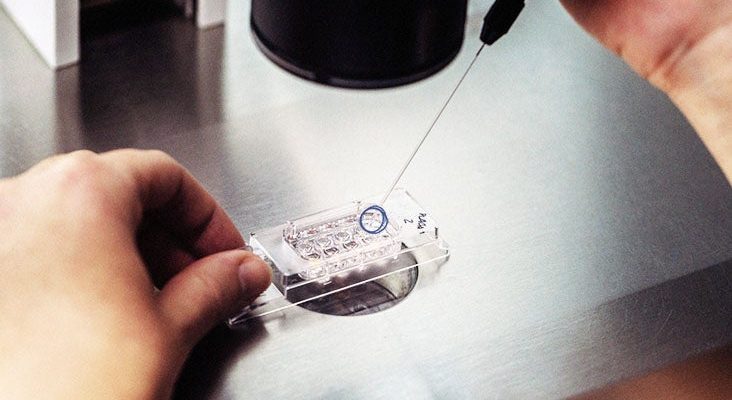
- In the United States, it’s recommended that people start getting screened for colorectal cancer with colonoscopies beginning at age 45.
- The guidelines recommend that colonoscopies be performed every 10 years until age 75.
- Researchers report that a new test for colorectal cancer that utilizes genetic risk factors may be able to reduce the frequency of colonoscopies for people considered at low risk.
Doctors could someday use a standardized risk score to assess patients for susceptibility to colorectal cancer and to determine how frequently a colonoscopy is needed.
A polygenic risk score (PRS) system for colorectal cancer is currently under development, researchers from the Institute for Molecular Medicine Finland (FIMM) at the University of Helsinki reported at the annual conference of the European Society of Human Genetics this week.
The findings haven’t been published yet in a peer-reviewed journal.
The score is intended to identify individuals at the highest risk of colorectal cancer and whether they would benefit from earlier screening for the disease.
“In the future, risk-based approaches considering genetic factors alongside other relevant risk factors have potential for personalizing recommendations regarding how we could most effectively screen for colorectal cancer,” Dr. Max Tamlander, a study co-author and doctoral researcher at FIMM, told conference attendees.
“People of different ancestries may have different risk factors and may therefore require different screening strategies,” said Dr. Liudmila Schafer, a medical oncologist specializing in gastrointestinal cancers and the founder of Doctor Connect.
“In order to improve the effectiveness of colorectal cancer screening, there is a need for more personalized recommendations such as genetic profiles,” Schafer, who was not involved in the study, told Medical News Today.
What to know about colorectal cancer screening test
The scoring system is being developed based on the health and genetic records of more than 400,000 people in Finland.
“In the U.S., genetic testing is becoming standard of care after someone is diagnosed with colorectal cancer,” said Dr. Jesse Houghton, the senior medical director of gastroenterology at Southern Ohio Medical Center Gastroenterology Associates.
“However, it is very rarely used to stratify patients to different screening strategies prior to a diagnosis, other than the use of a patient’s family history of colorectal cancer,” Houghton, who was not involved in the study, told Medical News Today.
How often should someone get a colonoscopy?
Currently, screening for colorectal cancer in the general population starts at age 60. In some other countries, screening — typically via colonoscopy — begins at age 50.
In the United States, the recommendation is to begin screening at age 45.
The new research suggests that such routine screening could begin as many as 16 years apart based on whether a person is determined to be at high risk or low risk based on their PRS scores.
Individuals assessed as being at the highest risk of colorectal cancer might be advised to begin screening earlier than current recommendations call for.
On the other hand, patients who are assessed as low risk may need screening less frequently (in the United States, most people are advised to get a colonoscopy every 10 years).
The importance of a new screening test for colorectal cancer
“[The PRS test] would be very helpful in stratifying patients to different screening pathways, or in potentially eliminating screening altogether in those patients with the lowest PRS scores,” said Houghton. “Earlier detection and cost savings would be two important benefits.”
Using PRS scores to adjust screening schedules could also benefit some people who are reluctant to get colonoscopies.
On the other hand, people who need more screenings might have to pay for them out of pocket.
“When it comes to colon cancer screening, there are many barriers to getting a colonoscopy,” said Dr. Bethany Malone, a colon and rectal surgeon based in Fort Worth, Texas. “One is the bowel prep, which many dread. The other is insurance coverage.”
For example, Malone told Medical News Today that although the U.S. guidelines on colonoscopies were recently changed so that screening for most people is recommended at age 45, “many insurance companies do not yet cover screening colonoscopies in this age group.”
“Even with a genetic risk assessment, patients may still have barriers to shortened intervals to surveillance colonoscopies due to the high out-of-pocket cost, which can be several hundreds of dollars,” she said.
The risks of colorectal cancer
Researchers noted that most people who develop colorectal cancer don’t have a family history of the disease or any other strong risk factors.
“Many cases of colorectal cancer are related to epigenetics, which involves changes in gene expression that do not involve alterations to the underlying DNA sequence,” said Schafer. “However, there is still much that we do not know. For instance, the role of the microbiome, the community of microorganisms living in our bodies, in colorectal cancer is not yet fully understood. There is ongoing research to determine if and how the microbiome might contribute to the development of this type of cancer.”
The PRS score could be another tool for assessing risk among these individuals, rather than just basing screening recommendations on attained age, researchers said.
“[A] colorectal cancer-specific PRS would be able to define more appropriate ages to start screening for individuals based on their genetic risk,” said Tamlander.
“If this work is continued into the future, we could potentially save millions of healthcare dollars by eliminating unnecessary colonoscopies in patients with low PRS scores, while at the same time, saving this procedure for patients at the highest risk,” added Houghton.
Source: Read Full Article
